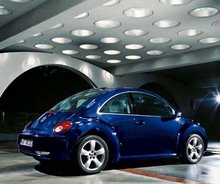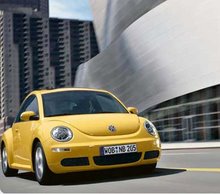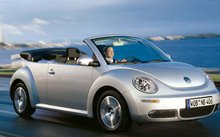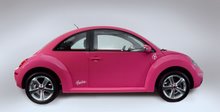Wednesday, March 21, 2007
Volkswagen Beetle - Decline and fall
Though extremely successful in the 1960s, the Beetle was faced with stiff competition from more modern designs. The Japanese had refined rear wheel drive water cooled front engined small cars to where they sold well in the North American market, and Americans introduced their own similarly sized rear wheel drive Ford Pinto, Chevrolet Vega, and AMC Gremlin in the 1970s. The superminis in Europe adopted even more efficient transverse engine front wheel drive layouts, and sales began dropping off in the mid 1970s. There had been several unsuccessful attempts to replace the Beetle throughout the 1960s; the Type 3, Type 4, and the NSU-based K70 were all failures. Only when production lines at Wolfsburg switched to the new watercooled, front-engined, front-wheel drive Golf in 1974 (sold in North America as the Rabbit) did Volkswagen produce a car as successful as the Beetle, though it would be periodically redesigned over its lifetime, while the Beetle used only minor refinements of the same design it had been introduced with.
The Golf did not kill Beetle production, which continued in smaller numbers at other German factories until 1978, when mainstream production shifted to Brazil and Mexico, markets where low operating cost was more important. The last Beetle was produced in Puebla, Mexico, in mid-2003. The final batch of 3,000 Beetles were sold as 2004 models and badged as the Última Edición, with whitewall tires, a host of previously-discontinued chrome trim, and the choice of two special paint colors taken from the New Beetle. Production in Brazil ended in 1986, then restarted in 1993 and continued until 1996. Volkswagen sold Beetles in the United States until 1978 (the Beetle convertible a.k.a. Cabriolet was sold until January 1980) and in Europe until 1985.
The Beetle outlasted most other automobiles which had copied the rear air-cooled engine layout such as those by Subaru, Fiat, Renault, and General Motors. However, Porsche's sport coupes which were originally based on Volkswagen parts and platforms continue to use the classic rear engine layout in the Porsche 911 series, which remains competitive in the 2000s.
The Golf did not kill Beetle production, which continued in smaller numbers at other German factories until 1978, when mainstream production shifted to Brazil and Mexico, markets where low operating cost was more important. The last Beetle was produced in Puebla, Mexico, in mid-2003. The final batch of 3,000 Beetles were sold as 2004 models and badged as the Última Edición, with whitewall tires, a host of previously-discontinued chrome trim, and the choice of two special paint colors taken from the New Beetle. Production in Brazil ended in 1986, then restarted in 1993 and continued until 1996. Volkswagen sold Beetles in the United States until 1978 (the Beetle convertible a.k.a. Cabriolet was sold until January 1980) and in Europe until 1985.
The Beetle outlasted most other automobiles which had copied the rear air-cooled engine layout such as those by Subaru, Fiat, Renault, and General Motors. However, Porsche's sport coupes which were originally based on Volkswagen parts and platforms continue to use the classic rear engine layout in the Porsche 911 series, which remains competitive in the 2000s.
Subscribe to:
Post Comments (Atom)




No comments:
Post a Comment